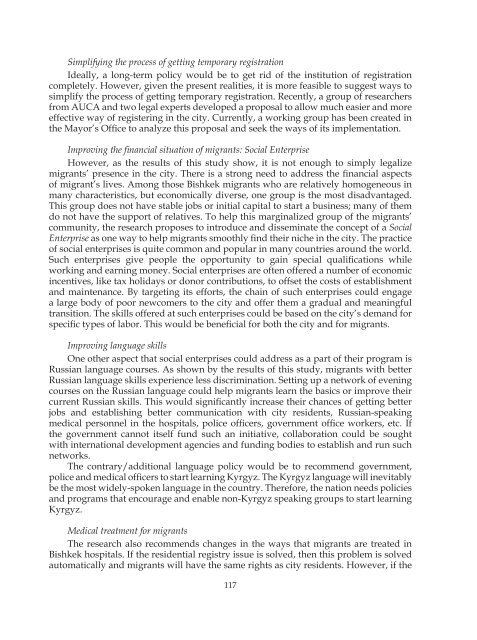KYRGYZSTAN TODAY Policy briefs on - Department of Geography
KYRGYZSTAN TODAY Policy briefs on - Department of Geography
KYRGYZSTAN TODAY Policy briefs on - Department of Geography
You also want an ePaper? Increase the reach of your titles
YUMPU automatically turns print PDFs into web optimized ePapers that Google loves.
Simplifying the process <strong>of</strong> getting temporary registrati<strong>on</strong><br />
Ideally, a l<strong>on</strong>g-term policy would be to get rid <strong>of</strong> the instituti<strong>on</strong> <strong>of</strong> registrati<strong>on</strong><br />
completely. However, given the present realities, it is more feasible to suggest ways to<br />
simplify the process <strong>of</strong> getting temporary registrati<strong>on</strong>. Recently, a group <strong>of</strong> researchers<br />
from AUCA and two legal experts developed a proposal to allow much easier and more<br />
effective way <strong>of</strong> registering in the city. Currently, a working group has been created in<br />
the Mayor’s Office to analyze this proposal and seek the ways <strong>of</strong> its implementati<strong>on</strong>.<br />
Improving the financial situati<strong>on</strong> <strong>of</strong> migrants: Social Enterprise<br />
However, as the results <strong>of</strong> this study show, it is not enough to simply legalize<br />
migrants’ presence in the city. There is a str<strong>on</strong>g need to address the financial aspects<br />
<strong>of</strong> migrant’s lives. Am<strong>on</strong>g those Bishkek migrants who are relatively homogeneous in<br />
many characteristics, but ec<strong>on</strong>omically diverse, <strong>on</strong>e group is the most disadvantaged.<br />
This group does not have stable jobs or initial capital to start a business; many <strong>of</strong> them<br />
do not have the support <strong>of</strong> relatives. To help this marginalized group <strong>of</strong> the migrants’<br />
community, the research proposes to introduce and disseminate the c<strong>on</strong>cept <strong>of</strong> a Social<br />
Enterprise as <strong>on</strong>e way to help migrants smoothly find their niche in the city. The practice<br />
<strong>of</strong> social enterprises is quite comm<strong>on</strong> and popular in many countries around the world.<br />
Such enterprises give people the opportunity to gain special qualificati<strong>on</strong>s while<br />
working and earning m<strong>on</strong>ey. Social enterprises are <strong>of</strong>ten <strong>of</strong>fered a number <strong>of</strong> ec<strong>on</strong>omic<br />
incentives, like tax holidays or d<strong>on</strong>or c<strong>on</strong>tributi<strong>on</strong>s, to <strong>of</strong>fset the costs <strong>of</strong> establishment<br />
and maintenance. By targeting its efforts, the chain <strong>of</strong> such enterprises could engage<br />
a large body <strong>of</strong> poor newcomers to the city and <strong>of</strong>fer them a gradual and meaningful<br />
transiti<strong>on</strong>. The skills <strong>of</strong>fered at such enterprises could be based <strong>on</strong> the city’s demand for<br />
specific types <strong>of</strong> labor. This would be beneficial for both the city and for migrants.<br />
Improving language skills<br />
One other aspect that social enterprises could address as a part <strong>of</strong> their program is<br />
Russian language courses. As shown by the results <strong>of</strong> this study, migrants with better<br />
Russian language skills experience less discriminati<strong>on</strong>. Setting up a network <strong>of</strong> evening<br />
courses <strong>on</strong> the Russian language could help migrants learn the basics or improve their<br />
current Russian skills. This would significantly increase their chances <strong>of</strong> getting better<br />
jobs and establishing better communicati<strong>on</strong> with city residents, Russian-speaking<br />
medical pers<strong>on</strong>nel in the hospitals, police <strong>of</strong>ficers, government <strong>of</strong>fice workers, etc. If<br />
the government cannot itself fund such an initiative, collaborati<strong>on</strong> could be sought<br />
with internati<strong>on</strong>al development agencies and funding bodies to establish and run such<br />
networks.<br />
The c<strong>on</strong>trary/additi<strong>on</strong>al language policy would be to recommend government,<br />
police and medical <strong>of</strong>ficers to start learning Kyrgyz. The Kyrgyz language will inevitably<br />
be the most widely-spoken language in the country. Therefore, the nati<strong>on</strong> needs policies<br />
and programs that encourage and enable n<strong>on</strong>-Kyrgyz speaking groups to start learning<br />
Kyrgyz.<br />
Medical treatment for migrants<br />
The research also recommends changes in the ways that migrants are treated in<br />
Bishkek hospitals. If the residential registry issue is solved, then this problem is solved<br />
automatically and migrants will have the same rights as city residents. However, if the<br />
117
















